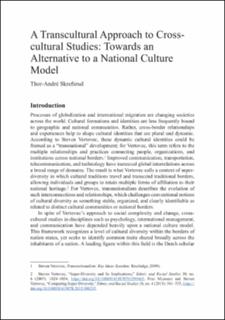A transcultural approach to cross-cultural studies: Towards an alternative to a national culture model
Peer reviewed, Journal article
Published version
Permanent lenke
https://hdl.handle.net/11250/3009201Utgivelsesdato
2022Metadata
Vis full innførselSamlinger
Sammendrag
The conventional tendency to identify culture as a delimited system of beliefs, values, and practices continues to capture the imagination of policymakers, educators, and practitioners. In particular, Geert Hofstede’s national culture model has become an influential and widely used tool to identify and compare cultural differences and similarities based on a presumed national identity that characterizes people living together within a geographic community. However, researchers have criticized Hofstede’s model for being static and deterministic, arguing that the framework should be supplemented with a more dynamic approach to cultural interaction. This article contributes to the discussion by proposing a transcultural approach to cross-cultural studies as an alternative. In the first section of this article, I examine Hofstede’s national culture model and critically address its shortcomings. In the second section, I present Wolfgang Welsch’s work on cultural transformation and demonstrate how Welsch’s concept of transculturality offers a convincing alternative to Hofstede’s model. Central to this approach is a nuanced and multidimensional understanding of the dynamic space in which cross-border social formation and identity construction operate. I conclude the article with a discussion of the relevance of a transcultural perspective for teachers working in an increasingly diverse classroom.
Beskrivelse
This work is licensed under a Creative Commons Attribution-NonCommercial 4.0 International License.

